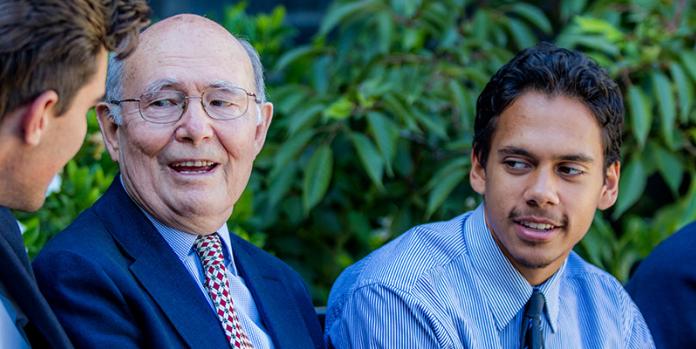A chance meeting at a golf club ultimately led Dr Nick Uren (OM 1957) to contribute to the Indigenous Bursary Programme at Melbourne Grammar School, but it was a circuitous route.
After retiring from his career as a prominent soil scientist, Nick enjoyed a game of golf now and then. Sitting in the club house after a game one day, he started a conversation with the person next to him, and this was to considerably reduce the time available to play golf from that point on.
After discovering Nick’s area of academic expertise, the person (Trevor Pratt), asked him to join the Mitchell Plateau Association, a group of people who was hoping to improve the lives of Wunambal people at Kandiwal – a cluster of Indigenous people living in a small settlement located on the Mitchell Plateau in the Kimberley region of Western Australia. Nick acceded and, more than a decade later, the community has been transformed.
“My role initially focused on creating sustainable food production systems for the outback community of mainly women and children,” explains Nick. “Over time I assisted with the introduction of some modern conveniences, including telecommunications, and the establishment of a school.”
The group also obtained funding to convert a ship container into a cool room and to construct a large array of solar panels to provide electricity mainly for air conditioners and refrigerators.
In recent years, Nick’s enthusiasm for assisting Indigenous people has resulted in him making regular financial contributions to the Melbourne Grammar School Indigenous Bursary Programme.
“I want to be able to help provide the opportunity for Indigenous boys to gain a strong education so that they can contribute back to their own communities in the future, in whatever capacity they can,” he says. “The Programme extends beyond the walls of the School. It shows young Indigenous men what is possible.”
For Year 12 student and Gunditjmara man, Jacquin Mifsud, this support doesn’t go unnoticed. “We’re given an education that a lot of other boys back home don’t get the opportunity to have,” he says.
Jacquin also observes the impact the Programme is having on his peers. “Non-Indigenous students learn about our history on a personal basis, not just in class. It opens the minds of students who might have limited experiences with different cultures,” he says.
Related topics
